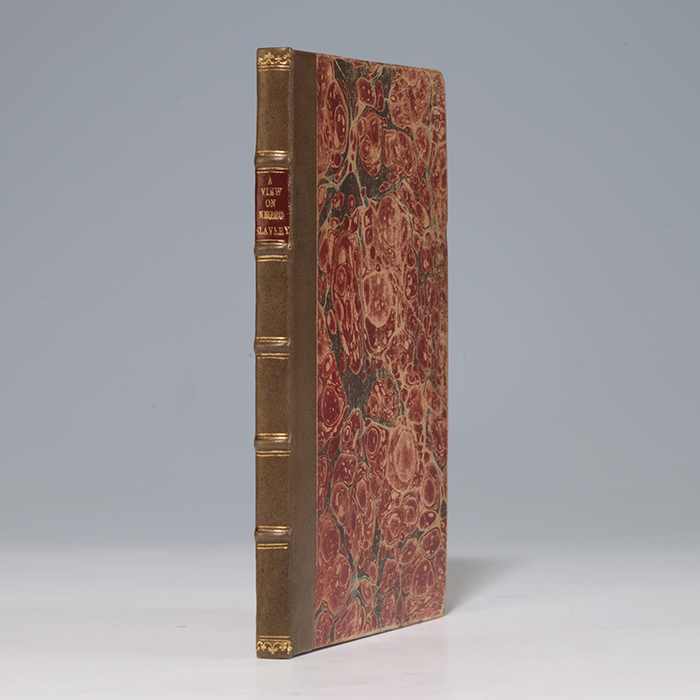
"THE LEGAL CONSTITUTION OF SLAVERY HAS BEEN WRITTEN IN CHARACTERS OF BLOOD": INSCRIBED FIRST EDITION OF LEADING BRITISH ABOLITIONIST ZACHARY MACAULAY'S 1823 NEGRO SLAVERY
(MACAULAY, Zachary). Negro Slavery; Or, A View of Some of the More Prominent Features of That State of Society, As It Exists in the United States of America and in the Colonies of the West Indies, Especially in Jamaica. London… Liverpool: Hatchard and Son, J. and A. Arch… W. Grapel, G. and J. Robinson, 1823. Octavo, period style half brown calf and marbled boards, raised bands, red morocco spine label; pp. (iv) (1)-118 (1). $3200.
First edition of a foundational work by preeminent British abolitionist Macaulay, condemning slavery and the slave trade in America and Britain—"where the makers of the laws are also the masters of slaves"— inscribed on the title page by him, "From the author."
"Macaulay holds an important place in the history of British anti-slavery.. he laid the foundations for the campaign that would lead in 1834 to the abolition of slavery throughout Britain's colonial possession" (ODNB). Born in Scotland, his life spanned the American and French Revolutions, "the rise and fall of Napoleon, the revolution in San Domingue and the creation of Haiti… the abolition of the slave trade and slavery." Famed for his persistence in collecting and documenting and collecting evidence, he "traveled as a passenger on one English slave ship about 1795 to discover what such a voyage was like" (Thomas, Slave Trade, 414). He also witnessed slavery's brutality during six years in Jamaica and eight in Sierra Leone, where "his determination to treat white and black as legally the same roused the ire of other Europeans… In 1796 he established militias in the colony and white men had the hitherto unprecedented experience of serving under black officers, many of whom, unlike the Europeans, had already fought in the American war" (Hall, Macaulay and Son, xix, 34). Macaulay was especially significant as "a leading figure in the parliamentary campaign which in 1807 resulted in victory for Wilberforce and his supporters… [and] in 1814, during the temporary peace in Europe, he traveled to Paris to present the British case for abolition of the slave trade by the continental power… In 1823 he helped to organize the Anti-Slavery Society" and anonymously published Negro Slavery "to reveal the true enormities of the slave system and to counter claims that conditions in the West Indies had actually improved" (ODNB).
In this powerful work Macaulay begins with a look a slavery in America, drawing on Hall's Travels (1818) and Fearon's Sketches of America (1818). He cites numerous eyewitness accounts, such as the public whipping of an enslaved boy by white men, "who relieved each other in the use of a horse-whip," and documents the treatment of free black men whose "freedom seems but a mockery." While conceding that "the great curse of America is the institution of slavery," Macaulay refuses to free Britain from guilt. He instead argues: "in the British colonies… as well as in the United States of America, where the makers of the laws are also the masters of the slaves, the legal constitution of slavery has been written in characters of blood" (emphasis in original). Macaulay, who was also the father of historian Thomas Macaulay, follows his searing look at slavery in America with an equally devastating view of slavery in Jamaica, one that extensively draws on his own experience. On publication "Thomas Clarkson wrote enthusiastically of using copies of Negro Slavery… to provide local groups and individuals with the evidence to enable them to petition the House of Commons to end the slave trade" (Whyte, Zachary Macaulay). Rear leaf of publisher's advertisement. Sabin 52269. Goldsmiths 23964. See Blockson 10052. With contemporary marginalia, occasional light underlining, in an unidentified hand.
Text fresh with only light foxing, mainly to preliminaries. A near-fine presentation copy of a core work in the history of slavery.